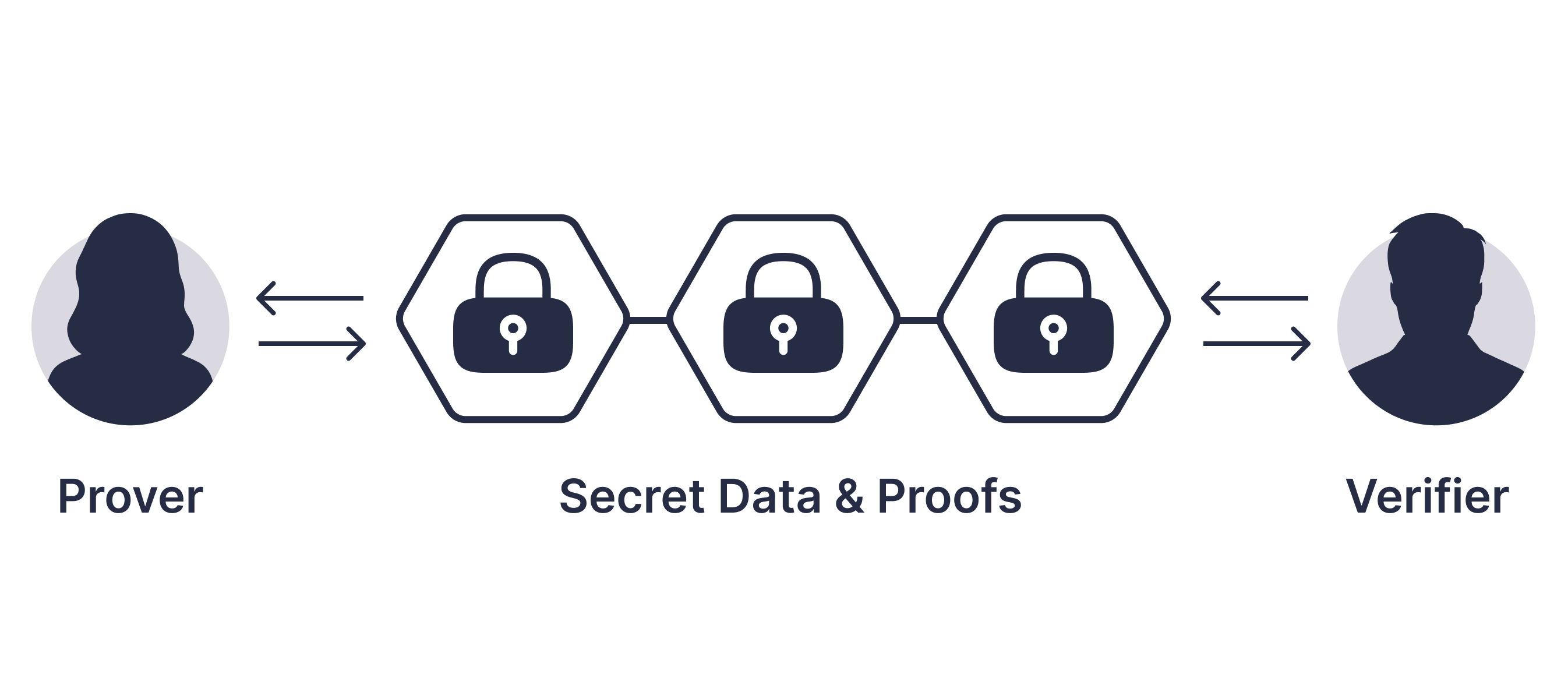Technical and Practical Challenges of Zero-Knowledge Proofs

This blog post will cover:
- Complexity of Computation
- Implementation complexity
- Mixability Issues
- Issues with Trust
- Equity and Ethics
- Conclusion
Zero Knowledge Proofs, or ZKPs, are an effective privacy and security solution applicable to blockchain and cybersecurity, among other fields. ZKPs do, however, have limitations and create both ethical and technical issues, just like any other technology. In this article, we examine in depth the various restrictions associated with Zero-Knowledge Proofs as well as the key factors to take into account when applying them.
Complexity of Computation
One of the main obstacles ZKPs must overcome is computational complexity. Let's take a closer look at this feature.
Fundamentals of Complexity in Computation
Computationally complicated, zero-knowledge proofs use sophisticated mathematical procedures like the elliptic curve. Elliptic curves are mostly used in cryptography, where they are the building blocks for cryptographic primitives like ZKPs.
ZKPs are computationally complex since they need handling big numbers and intricate mathematical calculations. Elliptic curves are used to offer security at comparatively low computing complexity and tiny key sizes.
Costs of Generating Proofs
Generating proofs can be a labor-intensive operation, particularly when dealing with ZK-SNARKs (Zero-Knowledge Succinct Non-Interactive Argument of Knowledge). Because of its simplicity and lack of interaction, this kind of ZKP works well in situations where compactness of proof is crucial.
The process of creating proofs entails several stages, such as creating intermediate proofs, calculating hash functions, and performing elliptic curve operations. Because of the significant processing power needed for this, systems with low computing resources may find the procedure expensive.
To achieve acceptable performance while maintaining security, it's crucial to strike a balance between computational complexity and proof production efficiency.
Scaling Problems
Scaling problems may arise in systems with high transaction or query volumes due to the utilization of intricate computing procedures in the creation and verification of ZKPs.
Technology advancements like hardware and better algorithms are crucial in overcoming these obstacles. ZKPs are more practical and economical when distributed systems and algorithm optimization are taken into consideration.
Implementation complexity
Technical Intricacy
High technical proficiency and an understanding of cryptography are needed to integrate ZKPs. Teams with little experience may encounter difficulties as a result.
Selection of a method: There are numerous ZKP techniques, and they all have special qualities. The ideal approach will vary depending on the particular application and system specifications. ZK STARKs are better suited for more complicated applications, whilst ZK-SNARKs might work better for private transactions.
Combining with current technology: Modifications to the current technology stack and architecture may be necessary for ZKP integration. This could entail upgrading smart contracts, blockchain protocols, and other systems.
Requirement for knowledgeable experts: Implementing ZKP effectively calls for knowledgeable experts with extensive backgrounds in programming and cryptography. For businesses without such experience, this could be difficult.
Variability within Systems
It may be challenging to choose the optimal solution for a given application due to the variety of ZKPs implementations, necessitating extra integration work.
Comparing various implementations: ZK-SNARKs and ZK-STARKs are examples of the variants that make up the heterogeneity of ZKP systems. To choose the best approach for a given use case, it is crucial to compare variations.
Assistance and upgrades: Variations in the level of support and changes may be necessary for different implementations. Certain aspects, like changing cryptographic parameters, can be difficult chores that need to be done carefully.
Changing to meet new standards: Over time, standards for cryptography may evolve. ZKP systems must therefore be able to quickly adjust to changes in standards without experiencing significant functional disruptions.
Mixability Issues
Due to the peculiarities of the mathematical techniques, mixability concerns are technical and cryptographic difficulties pertaining to the process of merging (mixing) evidence from various users, particularly in the context of ZK-SNARKs.
Mixability Restrictions
ZK-SNARKs may have some mixability issues even though they work well in private transactions. ZK-SNARKs' mathematical techniques have the potential to make aggregation more difficult, requiring more work and resources.
Using aggregated signatures or other proof combination techniques, which offer a more seamless aggregation procedure in the context of anonymous transactions, is one way to address mixability difficulties.
Limited Mobility
ZKPs often pertain to a certain computing job or situation. To ensure successful portability across several blockchains, ZK proofs may need to be modified because of variations in cryptographic parameters, protocols, and blockchain architecture.
ZKP format and protocol standardization could lessen portability problems. But at the moment, there might not be any standards at all, or they might be inconsistent, which makes mass adoption challenging.
Encouraging the creation of uniform cryptographic settings for ZKP can enhance the transferability of evidence across various blockchains and systems.
Issues with Trust
When thinking about zero-knowledge proofs, it's crucial to take into account the trust concerns surrounding different applications and facets of this technology.
Reliance on Reliable Sources
Certain Zero-Knowledge Proof implementations, such ZK-SNARKs, rely on a trustworthy initialization. At this stage, the system's overall security can hinge on users' ability to trust the people or organizations handling this startup procedure.
Reliance on a reliable source might be dangerous. The system as a whole may be seriously vulnerable if the trusted origin is tainted or compromised. The reliability of these reputable sources raises additional ethical concerns.
Researchers and producers of cryptography are experimenting with techniques like distributed initialization, which needs the approval of several parties, to lessen dependency on trusted sources.
Transparency of the Required Trust
When using ZKP solutions, it's critical to be explicit about the degree of trust that participants must possess. Misunderstandings and a decline in systemic trust may result from a lack of clarity on this matter.
Determining the degree of trust: The particular context of the system may determine what degree of trust is appropriate. For instance, sometimes a great degree of trust is necessary, but other times it might be enough.
Participant roles: Depending on their positions within the system, different individuals could need varying degrees of trust. It is crucial to consider these variations and establish policies that will offer a degree of trust suitable for every function.
Transparency and education: Systems can offer instructional materials and information on security and trust practices in the context of ZKP usage to increase the transparency of the necessary trust.
It is easier to ensure security and confidence in systems that use Zero-Knowledge Proofs when these challenges are taken into account.
Equity and Ethics
When employing ZKPs, debating fairness and ethical issues entails talking about a variety of topics, including conflicts between security, privacy and anonymity in transactions.
Ethical Issues
ZKP use creates ethical questions that need to be carefully considered and balanced solutions are needed, particularly when private blockchains are involved.
Ensuring fairness in the event of anonymous transactions is one of the important concerns. This presents a conundrum: how do you reconcile protecting privacy with stopping illicit activity?
A more open usage of anonymous transactions, such as those that enable tracking for security reasons while preserving participant privacy, could be one way to solve this issue.
Addressing Conflicts of Interest
Situations where privacy and security considerations may clash develop in the context of sensitive data and ZKP. It's challenging to strike a balance between these interests.
Creating security measures that both safeguard and prevent the exploitation of personal data is crucial. This could entail establishing guidelines for managing private data and abiding by applicable legal requirements.
Resolving conflicts of interest may be greatly aided by making sure consumers are aware of how their data is utilized and safeguarded. Clearly defined privacy policies and educational initiatives can enhance confidence.
Balance between Privacy and Transparency
ZKP offers the ability to tailor the balance between privacy and transparency that private blockchains aim to achieve.
Flexibility in configuration: Systems built on the ZKP architecture allow for flexible configuration. Participants can select the degree of privacy based on the particular situation thanks to this.
Evolution of Requirements: It is crucial to understand that standards for striking a balance between transparency and privacy may change over time, and systems need to be flexible enough to adjust to new situations.
Conclusion
The necessity of striking a balance between innovation and responsibility is highlighted by the ethical and technological concerns surrounding the application of zero-knowledge proofs. Overcoming these obstacles and realizing ZKPs' full potential will need establishing a clear framework for use and ongoing technological advancement.
SimpleSwap reminds you that this article is provided for informational purposes only and does not provide investment advice. All purchases and cryptocurrency investments are your own responsibility.


